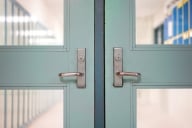You have /5 articles left.
Sign up for a free account or log in.

Wikimedia Commons
A growing number of colleges are choosing to fingerprint new employee hires, including faculty members. But what about being fingerprinted every day, to make sure professors are on the job? That could be the new reality for faculty members in the City Colleges of Chicago system, and they are speaking out against the possibility.
“We say No: Our dignity and our rights have no price,” reads an open letter written by faculty union leaders and published Wednesday on the American Association of University Professors’ Academe blog and elsewhere. “We seek the support of our students, their families, and every citizen of Illinois who understands the severity of this violation of our privacy.”
Faculty, who call the fingerprinting plan impractical and unethical, also plan on protesting today at the system’s Board of Trustees meeting.
“We believe that this is an extreme overreach, asking people to go and use their personal bodies for this purpose and to provide this information,” said Hector Reyes, associate professor of chemistry at Harold Washington College and vice campus chair of the American Federation of Teacher’s Local 1600 union, which represents full-time faculty and other college employees at all seven system colleges. Reyes and other members of the union wrote the letter, along with the leaders of the CCCLOC, the Illinois Education Association affiliate representing adjunct faculty. The clerical and technical workers’ union also has signed on.
Reyes added: “It seems an incredible violation of our bodies and our right to privacy and it feels very humiliating to many people."
In August, Chicago Community Colleges sent an email to employees, including faculty, notifying them it was piloting a new, biometric screening system to replace its outdated paper time-card system. Fingerprints are not stored in any central database or on individual machines. Instead, a scanner converts an employee’s fingerprints to binary numerical code that matches one stored in the device (but which cannot be reverted back to an image). College administrators already have begun using the system, and faculty members feel it's only a matter of time until they're required to use it, too.
The college does not currently collect any fingerprints from employees upon hire, other than from those working with small children.
Administrators say the scanner system, which costs $2.1 million, will pay for itself in about two years, and save $1 million annually in administrative costs. It could also cut down on absenteeism, which was about 1.6 percent last year across all employees for all reasons. And unlike cards, which can be scanned by any employee – fingerprints can’t be used fraudulently.
Nevertheless, many professors object.
“It seems very Orwellian,” said Maria Jaskot-Inclan, a professor speech and theater at Wilbur Wright College and a member of its Faculty Council. She said the body has denounced the fingerprinting policy formally in meetings. “A lot of us going into education because we’re ethical and we want to serve, and a lot of us have a higher system of ethics. So it’s a shame that we have to be approached [in this way].”
Moreover, she said, it’s quite obvious when a professor misses class. “The students will just scream,” she joked.
The faculty union members' letter also says the system sends the wrong message to students by fingerprinting faculty.
"Our students, who come in large numbers from communities of color, are understandably anxious about their professors and the staff that supports them being compelled to submit to such an overreaching system,” it says. “Anyone reading the Chicago newspapers for the past decade is aware of how the Latino and African American communities have been unfairly treated by the Chicago criminal justice system. And now they are concerned that their professors and other CCC employees will be subjected on a daily basis to a fingerprinting process that eerily evokes the processing of an arrestee. They ask themselves if they will be next.”
Katheryn Hayes, a system spokeswoman, said no decisions have been made as to if or when faculty will begin to use the new system. But Perry Buckley, president of the Local 1600 – which did not officially approve of the faculty members’ open letter before it was sent – said otherwise.
“Oh, it will happen,” he said of the daily scans for faculty. “We’re not negotiating what’s going to happen,” but when. Indeed, the August email to employees -- copy of which was obtained by Inside Higher Ed -- says that "Phase 5" of the rollout, the final phase, will involve full-time faculty.
But at this point, Buckley added, with no faculty implementation date even announced, faculty protests are “premature.” Buckley said he didn’t think the new system was a cause for concern, and chalked up faculty concerns to human nature. “It’s a new technology and people don’t like new technology,” he said. At any rate, he added, it is not a matter of collective bargaining.
Reyes disagreed, and said he believed it was something that could be settled in contract negotiations. He also hinted at possible legal action.
“They’re crossing the line, our constitutional right to privacy regarding our bodies is being affected,” he said. “It’s a very nebulous thing. Nothing has gone to the U.S. Supreme Court regarding this issue, and we don’t want to be the test case for that.”
AAUP also is concerned.
In an email, Greg Scholtz, director of academic freedom, tenure and governance, said this “is the first time, as far as we can recall, that we have encountered this phenomenon of fingerprinting employed as a routine method of verifying faculty attendance. I think it warrants discussion by our Committee A on Academic Freedom and Tenure.”
Henry Reichman, chair of Committee A and emeritus professor history at California State University at East Bay, agreed.
Beyond the ethical implications of such a policy, he said, it’s also highly impractical for professional employees, such as professors, who frequently do work at home.
“I really don’t see the need for faculty to check in,” he said.









